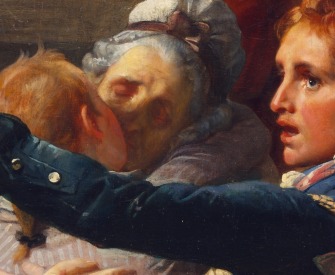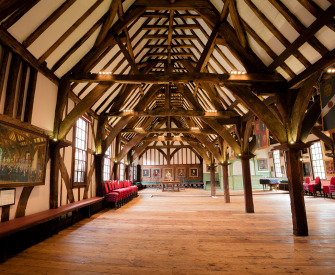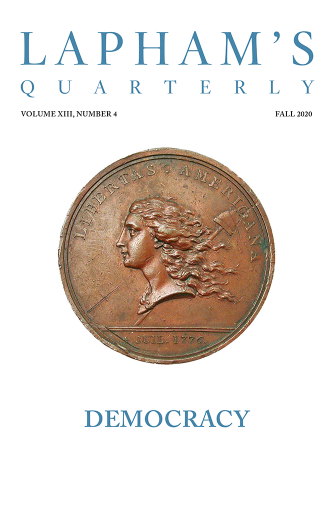Health care delivery is one of the tragedies still in America.
—Jewel Plummer Cobb, 1989Supply Chain
Daniel Defoe finds safe harbor on the water.
It pleased God that I was still spared, and very hearty and sound in health, but very impatient of being pent up within doors without air, as I had been for fourteen days or thereabouts; and I could not restrain myself, but I would walk out into the fields toward Bow; for I had a great mind to see how things were managed in the river and among the ships; and as I had some concern in shipping, I had a notion that it had been one of the best ways of securing oneself from the infection to have retired into a ship; and musing how to satisfy my curiosity in that point, I turned away over the fields from Bow to Bromley, and down to Blackwall to the stairs which are there for landing or taking water.
Here I saw a poor man walking on the bank, or seawall, as they call it, by himself. I walked a while also about, seeing the houses all shut up. At last I fell into some talk, at a distance, with this poor man; first I asked him how people did thereabouts.
“Alas, sir!” says he, “almost desolate; all dead or sick. Here are very few families in this part, or in that village” (pointing at Poplar), “where half of them are not dead already, and the rest sick.” Then he pointing to one house, “There they are all dead,” said he, “and the house stands open; nobody dares go into it. A poor thief,” says he, “ventured in to steal something, but he paid dear for his theft, for he was carried to the churchyard too last night.” Then he pointed to several other houses. “There,” says he, “they are all dead, the man and his wife and five children. There,” says he, “they are shut up; you see a watchman at the door”; and so of other houses.
“Why,” says I, “what do you here all alone?”
“Why,” says he, “I am a poor, desolate man; it has pleased God I am not yet visited, though my family is, and one of my children dead.”
“How do you mean, then,” said I, “that you are not visited?”
“Why,” says he, “that’s my house” (pointing to a very little low-boarded house), “and there my poor wife and two children live,” said he, “if they may be said to live, for my wife and one of the children are visited, but I do not come at them.” And with that word, I saw the tears run very plentifully down his face; and so they did down mine too, I assure you.
“But,” said I, “why do you not come at them? How can you abandon your own flesh and blood?”
“Oh, sir,” says he, “the Lord forbid! I do not abandon them; I work for them as much as I am able; and, blessed be the Lord, I keep them from want”; and with that I observed he lifted up his eyes to heaven, with a countenance that presently told me I had happened on a man that was no hypocrite, but a serious, religious, good man, and his ejaculation was an expression of thankfulness that in such a condition as he was in, he should be able to say his family did not want.
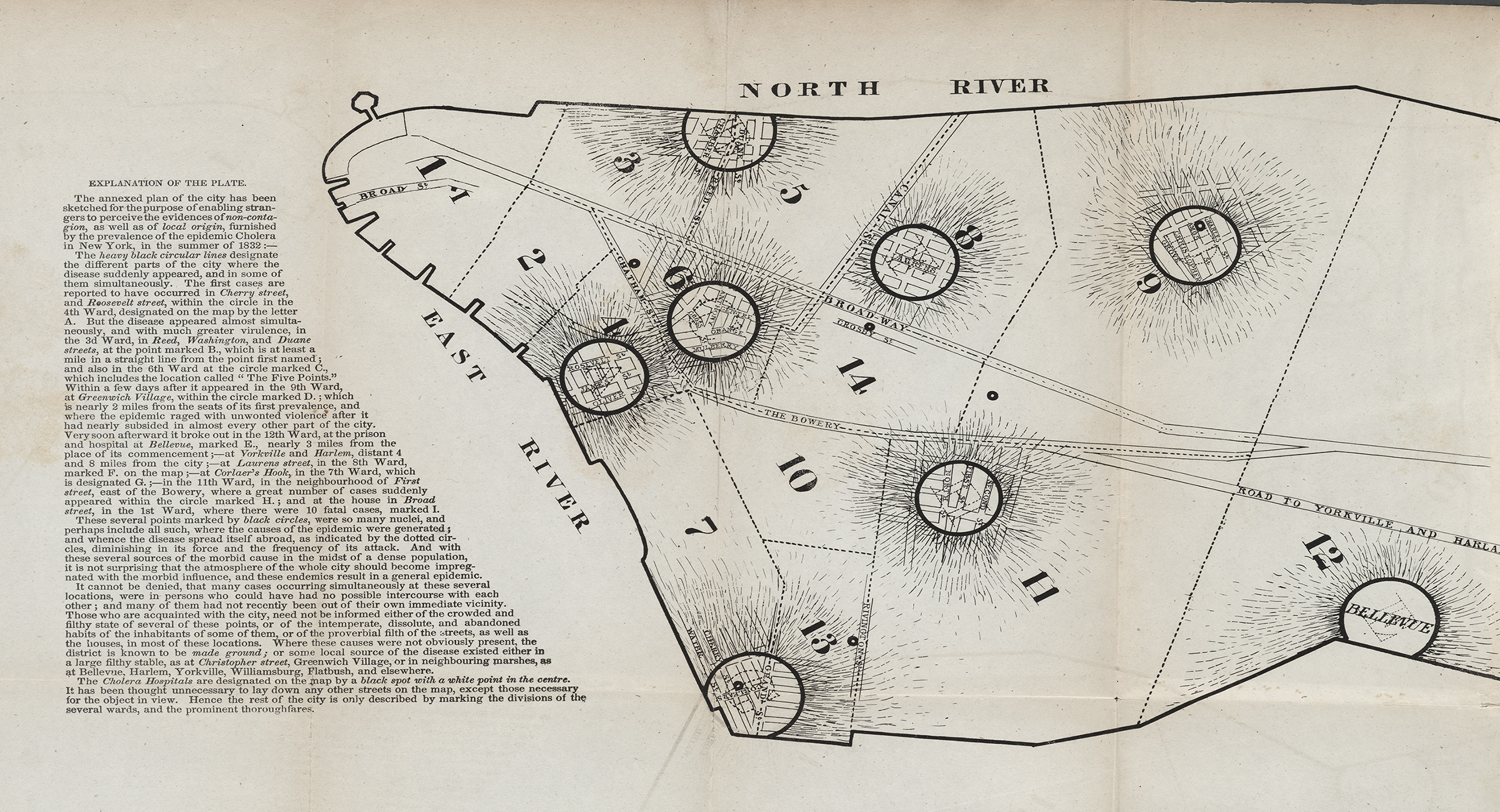
Map of New York City showing the spread of the cholera outbreak in the summer of 1832, from A Plain and Practical Treatise on the Epidemic Cholera, by David Meredith Reese, 1833. The New York Public Library, General Research Division.
“Well,” says I, “honest man, that is a great mercy as things go now with the poor. But how do you live, then, and how are you kept from the dreadful calamity that is now upon us all?”
“Why, sir,” says he, “I am a waterman, and there’s my boat,” says he, “and the boat serves me for a house. I work in it in the day, and I sleep in it in the night; and what I get I lay down upon that stone,” says he, showing me a broad stone on the other side of the street, a good way from his house; “and then,” says he, “I halloo, and call to them till I make them hear; and they come and fetch it.”
“Well, friend,” says I, “but how can you get any money as a waterman? Does anybody go by water these times?”
“Yes, sir,” says he, “in the way I am employed there does. Do you see there,” says he, “five ships lie at anchor” (pointing down the river a good way below the town), “and do you see,” says he, “eight or ten ships lie at the chain there, and at anchor yonder?” (pointing above the town). “All those ships have families on board, of their merchants and owners and suchlike, who have locked themselves up and live on board, close shut in, for fear of the infection; and I tend on them to fetch things for them, carry letters, and do what is absolutely necessary, that they may not be obliged to come onshore; and every night I fasten my boat on board one of the ship’s boats, and there I sleep by myself, and, blessed be God, I am preserved hitherto.”
“Well,” said I, “friend, but will they let you come on board after you have been onshore here, when this is such a terrible place, and so infected as it is?”
“Why, as to that,” said he, “I very seldom go up the shipside, but deliver what I bring to their boat, or lie by the side, and they hoist it on board. If I did, I think they are in no danger from me, for I never go into any house onshore, or touch anybody, no, not of my own family; but I fetch provisions for them.”
“Nay,” says I, “but that may be worse, for you must have those provisions of somebody or other; and since all this part of the town is so infected, it is dangerous so much as to speak with anybody, for the village,” said I, “is, as it were, the beginning of London, though it be at some distance from it.”
“That is true,” added he; “but you do not understand me right; I do not buy provisions for them here. I row up to Greenwich and buy fresh meat there, and sometimes I row down the river to Woolwich and buy there; then I go to single farmhouses on the Kentish side, where I am known, and buy fowls and eggs and butter and bring to the ships, as they direct me, sometimes one, sometimes the other. I seldom come onshore here, and I came now only to call on my wife and hear how my family do and give them a little money, which I received last night.”
“Poor man!” said I; “and how much hast thou gotten for them?”
“I have gotten four shillings,” said he, “which is a great sum, as things go now with poor men; but they have given me a bag of bread too, and a salt fish and some flesh; so all helps out.”
I asked him then how it came to pass that those people who had so shut themselves up in the ships had not laid in sufficient stores of all things necessary. He said some of them had—but on the other hand, some did not come on board till they were frighted into it and till it was too dangerous for them to go to the proper people to lay in quantities of things, and that he waited on two ships, which he showed me, that had laid in little or nothing but biscuit bread and ship beer, and that he had bought everything else almost for them. I asked him if there were any more ships that had separated themselves as those had done. He told me yes, all the way up from the point, right against Greenwich, to within the shore of Limehouse and Redriff, all the ships that could have room rode two and two in the middle of the stream, and that some of them had several families on board. I asked him if the distemper had not reached them. He said he believed it had not, except two or three ships whose people had not been so watchful to keep the seamen from going onshore as others had been, and he said it was a very fine sight to see how the ships lay up the Pool.
When he said he was going over to Greenwich as soon as the tide began to come in, I asked if he would let me go with him and bring me back, for that I had a great mind to see how the ships were ranged, as he had told me. He told me, if I would assure him on the word of a Christian and of an honest man that I had not the distemper, he would. I assured him that I had not; that it had pleased God to preserve me; that I lived in Whitechapel but was too impatient of being so long within doors, and that I had ventured out so far for the refreshment of a little air, but that none in my house had so much as been touched with it; so when the tide came up to his boat, I went in, and he carried me to Greenwich. While he bought the things which he had in his charge to buy, I walked up to the top of the hill under which the town stands, and on the east side of the town, to get a prospect of the river. But it was a surprising sight to see the number of ships which lay in rows, two and two, and some places two or three such lines in the breadth of the river, and this not only up quite to the town, between the houses which we call Ratcliff and Redriff, which they name the Pool, but even down the whole river as far as the head of Long Reach, which is as far as the hills give us leave to see it.
I cannot guess at the number of ships, but I think there must be several hundreds of sail; and I could not but applaud the contrivance: for ten thousand people and more who attended ship affairs were certainly sheltered here from the violence of the contagion and lived very safe and very easy.
I returned to my own dwelling very well satisfied with my day’s journey, and particularly with the poor man; also I rejoiced to see that such little sanctuaries were provided for so many families in a time of such desolation. I observed also that as the violence of the plague had increased, so the ships which had families on board removed and went farther off, till, as I was told, some went quite away to sea and put into such harbors and safe roads on the north coast as they could best come at.
But it was also true that all the people who thus left the land and lived on board the ships were not entirely safe from the infection, for many died and were thrown overboard into the river, some in coffins, and some, as I heard, without coffins, whose bodies were seen sometimes to drive up and down with the tide in the river.
But I believe I may venture to say that in those ships which were thus infected, it either happened where the people had recourse to them too late, and did not fly to the ship till they had stayed too long onshore and had the distemper upon them (though perhaps they might not perceive it), and so the distemper did not come to them on board the ships, but they really carried it with them; or it was in these ships where the poor waterman said they had not had time to furnish themselves with provisions, but were obliged to send often onshore to buy what they had occasion for, or suffered boats to come to them from the shore. And so the distemper was brought insensibly among them.
And here I cannot but take notice that the strange temper of the people of London at that time contributed extremely to their own destruction. The plague began, as I have observed, at the other end of the town, namely, in Long Acre, Drury Lane, etc., and came on toward the city very gradually and slowly. It was felt at first in December, then again in February, then again in April, and always but a very little at a time; then it stopped till May, and even the last week in May there was but seventeen, and all at that end of the town; and all this while, even so long as till there died above three thousand a week, yet had the people in Redriff, and in Wapping and Ratcliff, on both sides of the river, and almost all Southwark side, a mighty fancy that they should not be visited, or at least that it would not be so violent among them. Some people fancied the smell of the pitch and tar, and such other things as oil and rosin and brimstone, which is so much used by all trades relating to shipping, would preserve them. Others argued it, because it was in its extremest violence in Westminster and the parish of St. Giles and St. Andrew, etc., and began to abate again before it came among them.
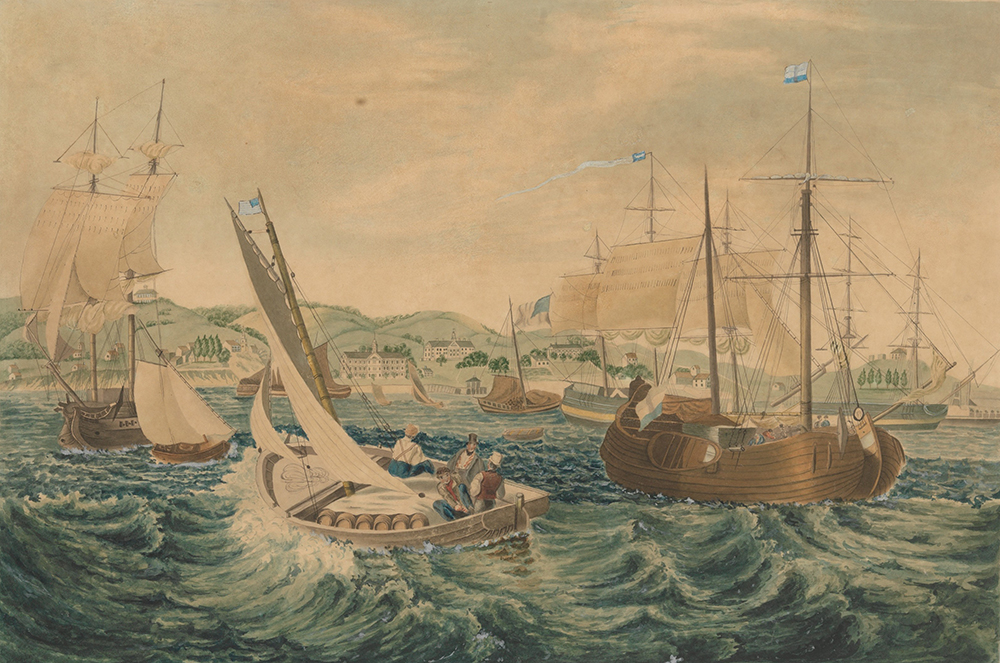
Quarantine, Staten Island, attributed to William James Bennett, 1833. The Metropolitan Museum of Art, the Edward W.C. Arnold Collection of New York Prints, Maps, and Pictures, bequest of Edward W.C. Arnold, 1954.
This, I say, made the people of Redriff and Wapping, Ratcliff and Limehouse, so secure, and flatter themselves so much with the plague’s going off without reaching them, that they took no care either to fly into the country or shut themselves up. Nay, so far were they from stirring that they rather received their friends and relations from the city into their houses, and several from other places really took sanctuary in that part of the town as a place of safety, and as a place which they thought God would pass over, and not visit as the rest was visited.
And this was the reason that when it came upon them, they were more surprised, more unprovided, and more at a loss what to do than they were in other places; for when it came among them really and with violence, as it did indeed in September and October, there was then no stirring out into the country, nobody would suffer a stranger to come near them, no, nor near the towns where they dwelled; and, as I have been told, several that wandered into the country on Surrey side were found starved to death in the woods and commons, that country being more open and more woody than any other part so near London, especially about Norwood and the parishes of Camberwell, Dullege, and Lusum, where, it seems, nobody durst relieve the poor distressed people for fear of the infection.
This notion having, as I said, prevailed with the people in that part of the town, was in part the occasion, as I said before, that they had recourse to ships for their retreat; and where they did this early and with prudence, furnishing themselves so with provisions that they had no need to go onshore for supplies or suffer boats to come on board to bring them—I say, where they did so, they had certainly the safest retreat of any people whatsoever; but the distress was such that people ran on board, in their fright, without bread to eat, and some into ships that had no men on board to remove them farther off, or to take the boat and go down the river to buy provisions where it might be done safely, and these often suffered and were infected on board as much as onshore.
As the richer sort got into ships, so the lower rank got into hoys, smacks, lighters, and fishing boats; and many, especially watermen, lay in their boats; but those made sad work of it, especially the latter, for, going about for provision, and perhaps to get their subsistence, the infection got in among them and made a fearful havoc; many of the watermen died alone in their wherries as they rid at their roads, as well as above bridge as below, and were not found sometimes till they were not in a condition for anybody to touch or come near them.
Indeed, the distress of the people at this seafaring end of the town was very deplorable, and deserved the greatest commiseration. But alas! This was a time when everyone’s private safety lay so near them that they had no room to pity the distresses of others; for everyone had death, as it were, at his door, and many even in their families, and knew not what to do or whither to fly.

Daniel Defoe
From A Journal of the Plague Year. Presented as an eyewitness account of the Great Plague of London, Defoe’s fictional narrative was written nearly sixty years after the epidemic. In March 2020 the billionaire David Geffen posted a photo on Instagram of his $590 million yacht resting at anchor. “Isolated in the Grenadines avoiding the virus,” he wrote. One London yacht broker noted a boom in luxury yacht rentals during the pandemic. “One family has taken a yacht for nine weeks,” the broker said, “and we have also had two long-term bookings for yachts of 130 feet and 230 feet.”
